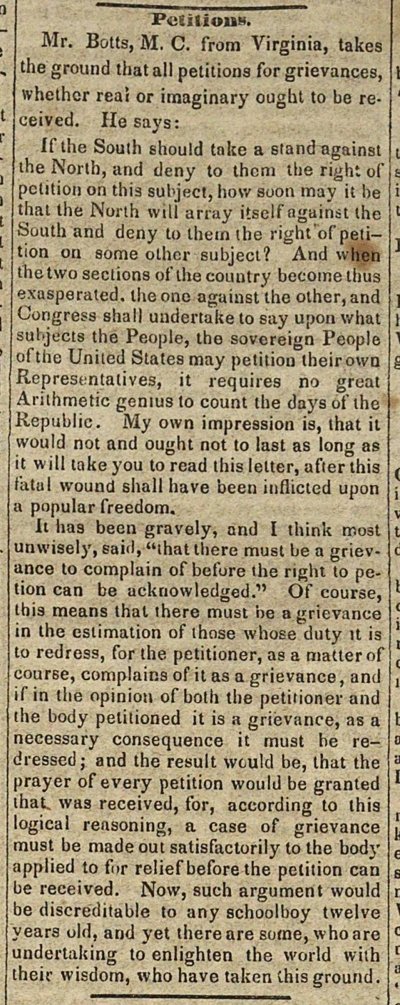Petitions

Mr. BöttSjM. C. from Virginia, takes the ground that all petitions for grievances, whethcr reaà or imaginary ougbt to be received. Hesays: Ãf the Soulh 8hould tnke a stand against the North, and deny to thcm the right of pclitioii on thia subject, how suon may it be thal the North wül arifay itself agaiñát thc South and deny to them ihe right'of petition on some olhcr subject? And when thetwo sections of'lhe country become thus exusperated. ihe one against the other, and Congress sha!) undertake to say upon vhat subjects the People, the sovereign People ofthe United States may petition theirown Repres(;ntatives, it requires no great Ariihmetic genius to count the days óf the Republic. My own impression Ãs, that it would not and ought not to last as long as it will take you to read this letter, after this fatul wound shall have been inflicted upon a popular freedom.ii nas oeen graveiy, and 1 tlimk most unwisely, eaid, "ihat there must be a grievance to complain of beture the right to petion can be acknowledged." Of course, tbia means that ihere must be a grievanee in the esiimation of ihose whose duty it is to redress, for the pctitioner, as a matter of course, complains of it as a grievance , and if in llie opinión of both the petitioner and the body petitioned it is a grièvance, as a necessary consequence it must be redressed; and the result wcukl be, that the prayer of every petition would be granted thau was received, for, according to this logical reasoning, a case of grievance must be made out satisfactorily to the body appiied to for relief before the petition can be received. Now, such argument would be discréditable to any schoolboy twelve years oÃd, and yet there are sume, whoare undertaking to enlighten the world wiih their wisdom, who have taken this ground .
Article
Subjects
United States Congress
Old News
Signal of Liberty
John Botts
Virginia